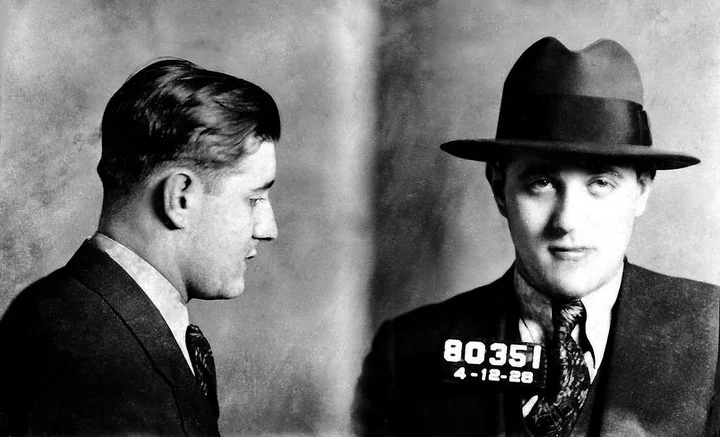Mugshot of Benjamin “Bugsy” Siegel, circa 1929. | Public domain.
###
Reader, you can expect to see a lot fewer mugshots in the news and on social media for the foreseeable future thanks to a recent ruling in the Ninth Circuit U.S. Court of Appeals.
Both the Humboldt County Sheriff’s Office and the Eureka Police Department confirmed to the Outpost that they have stopped regularly publishing pre-trial booking photos of arrestees in light of the court’s ruling in the case of Houston v. Maricopa County. (You can read the ruling in full via the link at the bottom of this post.)
That case, which originated in Arizona, concerned a man name Brian Houston, who was arrested by Phoenix police in January 2022, charged with assault and had his booking photo published on the Maricopa County Sheriff’s Office “Mugshot Lookup” website.
That sheriff’s office regularly posted such arrestee photographs on its website, accompanied by identifying information including each person’s full name, birthdate and an entry under “Crime Type” describing the category of their alleged offense. Pushing a “More Details” button would have revealed Houston’s sex, height, weight, hair color, eye color and the specific charges on which he was arrested.
The “Mugshot Lookup” website showed pictures and personal information of recent arrestees only for three days, after which the posts were removed. But, of course, the court observed, three days is plenty of time for that info to be scraped and redistributed by anyone with an internet connection.
Houston, whose charges were dropped shortly after his arrest, sued the county, alleging that his post on the “Mugshot Lookup”” page caused him to suffer “emotional distress and public humiliation,” “permanently damaged” his “business and personal reputation” and “placed [him] at risk of identity theft, fraud and extortion.”
In its defense, Maricopa County argued that its “Mugshot Lookup” posts promote transparency in the criminal legal system. The court’s three-judge panel gave that argument the side-eye, noting that the “Mugshot Lookup” page was pretty one-sided in its commitment to transparency. For example, Houston’s entry didn’t “contain the names of the arresting officers, the division of the County police department responsible for the arrest, whether charges were pursued or dismissed, or the jail in which Houston was held.”
“The ‘Mugshot Lookup’ posts thus shed light only on arrestees, not on the operations of the Sheriff’s Office or County law enforcement,” the decision notes.
As for the county’s defense of “transparency,” the court opined, “that word is not a talisman that dispels the specter of government punishment.”
The court allowed that mugshots can sometimes serve public safety and “system transparency” functions — for example, when the F.B.I. issues photos of post-conviction sexual offenders to inform the public or when police departments distribute fliers with the face of an active shoplifter to local businesses. But the court said Maricopa County failed to provide clarity and support for its “transparency” argument.
“In short,” the ruling says, “even if transparency is a legitimate government interest, no rational relationship exists between that goal and the County’s gratuitous inclusion of at least some of Houston’s personal information in its public ‘Mugshot Lookup’ post,” such as his birthdate and weight.
Seems plausible that the intent of such posts is punitive, the court says.
“The result is public exposure and humiliation of pretrial detainees, who are presumed innocent and may not be punished before an adjudication of guilt.”
As such, the court found the publishing of mugshots in this way unconstitutional.
Laura Montagna, public information officer with the Eureka Police Department, told the Outpost via email that EPD is no longer posting pre-trial mugshots on social media, but some booking photos may be distributed upon request.
Humboldt County Sheriff’s Office Public Information Officer Meg Ruiz said via email that, in light of this recent decision, “the Humboldt County Sheriff’s Office will not be publishing or releasing booking photos unless there is a public safety need for us to do so.”
Anyone seeking a booking photo must submit a California Public Information Act request, she added, “and there is no guarantee that it will be granted as it will need to meet a public safety need criteria in order to be released.”
###
DOCUMENT: Houston v. County of Maricopa

CLICK TO MANAGE